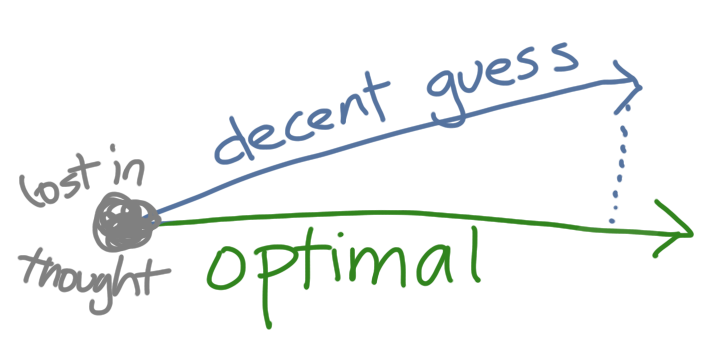Things to do when you aren't sure what to do with your life
Posted: - Modified: | planning“What should I do with my life?”
When you have the freedom to set your own TO-DO list, it can be difficult to decide what goes on it. Should you focus on one project or juggle a few? Why one goal instead of another? How much time should you spend on something new, and how much time on polishing something old?
It's easy to get stuck in rumination. You can end up spending so much time and mental energy worrying about what you should do with your life that you don't actually get things done.
Here are some things I'm learning about learning from constant progress and setting limits on second-guessing.
I keep a list of tasks that I can work on even when I feel the twinges of doubt. I organize this by project and type of task. For example, I feel like coding, I can quickly pick a task related to that. This means that if I don't feel inspired, I can trust that the Sacha who made this list came up with tasks that would be a pretty good use of my time. It might not be the best use, but it won't be a complete waste either. These unscheduled tasks give me a baseline of productivity. If I don't want to work on something, I have to justify that by coming up with another task that would be even better.
For example, I know that I will generally get good value out of:
- writing 1,000 to 2,000 words to answer a question or help people learn more
- learning more about a specific programming language or platform by reading tutorials, source code, or blog posts, by working through tutorials, or by coding
- writing tests and code
- sketchnoting a video or book
- exercising or cooking
- braindumping thoughts
You probably have a list like that too: types of tasks that tend to work well for you, especially if they leave you feeling awesome.
Even a good list of tasks wouldn't help much if I'm switching projects all the time. I'd keep getting started on different things, with very little to show for it. To deal with this second-guessing, I try to publish or share things as early as possible. That way, even if I switch focus, my notes are out there for other people to build on. This also opens it up for feedback and appreciation, which is great for encouraging me to work on something even more.
I also limit when I plan. During the week, I might decide to focus more on one project instead of another, but I don't dump all my previous projects. If I come up with an idea I'm curious about, I add it to my list for later review. Every month, I look at my goals and evaluate my projects, checking which ones are still relevant. Every year, I look at my values and evaluate my goals.
When I catch myself procrastinating a task, I often use that as an opportunity to evaluate my projects and goals as well. Am I procrastinating because other projects have become more important? Great, I can replace the task with one for a higher-priority project. On the other hand, am I procrastinating because I overvalue immediate rewards over my long-term goals? The project/goal review reminds me why something matters and helps me get back on track. I don't spend a lot of time thinking about whether I should come up with new projects instead. The time for that is when I review my goals and plan my month, not when I feel like procrastinating things.
Another thing that helps me box in my tendency to over-plan is reminding myself that I'm not trying to decide the absolute best thing to do with my time. Good enough is good enough. If I move forward, even if it's not quite optimal, I can learn more than I would standing still. If I feel I'm slightly off-track, that can teach me about where the track is.

So it's worth spending a little time making sure I'm pointed in roughly the right direction, but it might not make to spend four hours trying to figure out how I can get 100% instead of 80% value out of an afternoon.
It's good to periodically check if I'm going the right way. I'm probably doing okay if:
- I can tell how I'm different or what I learn week to week, month to month
- My projects include several things that excite me, and I'm learning from my experiences working on different tasks
- Other people tell me that what I share or work on is useful
- Things build up; scale or network effects happen
If those are true, then I'm probably not wasting my time. I might even be able to get away without worrying about better ways at all. I can wait for people to suggest better ways to spend my time, and I can listen for suggestions that resonate with me.
What do you do to avoid getting stuck in the question “What should I do with my life?”
